Thailand Why hasn’t democracy been fixed?July 2010
The disturbance in Thailand
About 2,000 people were killed or injured in Bangkok in May 2010 during the Thai military crackdown on a rally of the Thaksin group (the Red Shirts, the United Front for Democracy Against Dictatorship (UDD)), who call for the dissolution of the National Assembly of Thailand and a general election. Although there had been several military coups, this disturbance culminated in arson, looting and bloodshed. While Thai judicial authorities invalidated the result of a general election and ordered the dissolution of parties, for all that there is a constitution, the prosecution and courts haven’t fulfilled their functions under the emergency law. The Red Shirts caused the ASEAN summit to be postponed, and anti-Thaksin group (the Yellow Shirts, the People’s Alliance for Democracy (PAD)), blockaded six airports including the new Bangkok International Airport. Those internal affairs cause damage to foreign countries as well. As if the country were invaded by another country and put under a colonial rule, its past has been wiped out. “Why hasn’t democracy become established in Thailand? Why do the Thai people go so far without thinking of the effects on economy and credit?” Those questions surged up within me.
What led the Thai military to carry out a crackdown?
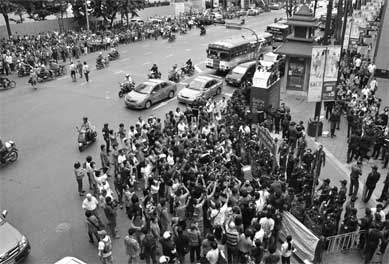
The 31st Thai Prime Minister Thaksin Shinawatra, who was born in 1949, had pursued the policy of improvement in the living standard for the poor and needy for about five and a half years since 2001 by adopting ‘the 30-baht medical care program’ and ‘the village fund program’ for the first time in Thai history. However, the induction of concessions into the Shinawatra combine and concealment of assets by the Thaksin family came to light and the anti-Thaksin movement began. In September 2006 Thaksin was expelled by a military coup. But the next year the Thaksin group won the general election with public support and came into power again, and then the anti-government movement by the Yellow Shirts rekindled. The Thai Rak Thai Party (TRT) on the Thaksin’s side and the People’s Power Party, a successor to TRT, were dissolved in 2007 and in 2008 respectively, on the grounds of election offenses.
The extension of the state of emergency
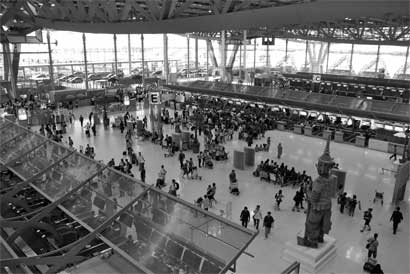
As a result, the second leading party, the Democratic Party on the Yellow Shirts’ side returned to power at the end of 2008. Their opponent, the Red Shirts, held a large-scale protest rally in March 2010, calling for the immediate dissolution of the National Assembly. The military made a raid on this rally, which developed into the incident where about 2000 people were killed of injured.
The scene of bloodshed
I couldn’t visit Thailand at the very height of the incident because I had been tied up in my work in Japan, but I wanted to clear up my open questions. There were some mass media reports, but I was not satisfied with their explanation. In July 2010, when a three-month state of emergency was extended for three months, I could finally visit to Thailand for on-the-spot coverage. My Thai friend joined me. He said, “We Thai people don’t know that. If I were to venture an opinion, I would say that the reason was because Thai lies in the tropics.” He is a fatalist. I’m going to ask the people in Bangkok and local regions how they feel and what they think about.
At the new Suvarnabhumi International Airport, where I got out of an airplane, there was a long line at the entry inspection as usual. I couldn’t believe that thousands of the Yellow Shirts staged a sit-in at the airport, calling for the resignation of the then Prime Minister Somchai of the People’s Power Party, and the airport was closed for ten days in November 2008. Since 10,000 passengers use the airport in a day, the loss amounted to nearly 150 billion baht (1 baht ≒ 2.8 yen), so at that time the growth rate of 2010 gross domestic product (GDP) was estimated to drop to 2 % of the lowest rate since 1999 because of the aftermath. The growth rate during the period from October to December, however, was 5.8 %, which showed a rise compared with the corresponding period last year, due to an increase in exports including the export of automobiles to China. Strangely the disturbance at the airport only affected slightly, and the Thai macro-economy has still firm.
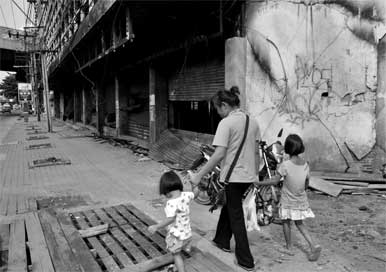
The military stormed the barricade built by the Red Shirts on May 19, 2010, and the demonstration broke up. First, I went to the scene. I saw a noticeable banner on a charred building near the Victory Monument, where the Red Shirts had gathered before they moved to Lumphini Park. The banner said, ‘We are in trouble. We are waiting for the help of the government.’ This building had been set on fire. The building of Electricity Authority of Thailand on the Rama IV Road, which was blocked off by the Red Shirts’ barricades, was also covered with soot. The inside of the building was completely destroyed, so that I couldn’t see how the building had been used before the fire. On the temporary fence around the ruined building was carried the slogan ‘Let’s accept the ideas different from yours. Please stick to nonviolence and follow the law’ by the Labor Union of the Bangkok Metropolitan Electricity Authority of Thailand.
A social welfare activist Prateep Ungsongtham Hata (57) had delivered speeches at the place next to the police box at Khlong Toei, the entrance to the Rama IV Road, from May 15th to 19th. Hundreds of people gathered in the day time and more than 10,000 people at night. The gathering was against the emergency law and an arrest warrant against her was issued before May 21st. Most of the demonstrators were farmers from the northeast Thailand or workers who came to work from the provinces to Bangkok and settled in the slums. Their social stratum overlapped with that of the people whom she had supported in their education, healthcare and residential environment. She visited the people who were injured at the demonstration, and also made contact with the family of the people who were killed. She was worried about the increasing casualties. She tried to persuade the people not to join the demonstration, while she gave opportunities to speak to the Red Shirts who could not talk on the stage in the center.
The Red Shirt leaders conceded defeat on May 19th to prevent further deaths and began to surrender, but the sound of gunfire and explosions rang out at the Ratchaprasong Intersection, where the stage for the rally had been put up, after around 5:30 p.m. on the same day. Some of the Red Shirts who got angry at the public concession of defeat disobeyed and fought a gun battle against the security corps or turned into a mob. Most of the Red Shirt supporters and ordinary passers-by near the stage, aware of the danger, took shelter in Pathumwanaram Temple, which was about 30 meters to the west of the stage. This temple was appointed as a shelter by agreement between the government and the Red Shirts. However, around 7:00 p.m. on the same day a medical treatment tent pitched in the precincts near the gate came under fire, and six people including the staff were killed.
I visited the scene and I found some 3-cm-deep bullet holes in the surface of an asphalt road. In front of the temple there is an elevated station of Skytrain. Judging from the angle the tent was apparently shot from the station. If the bullet holes were examined, what kind of guns had been used and where the bullets had come from would be revealed, and together with the eyewitnesses’ testimony the suspects would be narrowed down. But the investigation doesn’t seem to make any progress, while no destruction of evidence like tearing off the asphalt can be seen. Why? Was the reason that the victims were the Red Shirts? Some flower wreaths were put on the ground of the precincts for the memorial service for the victims held on the 100th day after their death. People wearing a red shirt visited by twos and threes and offered red roses. When I was taking pictures of the scene, one of the visitors to the temple whispered in my ear. He said that they would be at Rachaprasong Intersection at four in the evening. The words like ‘gathering’ and ‘demonstration’ were carefully avoided because the state of emergency has not been lifted yet.
I decided to go the intersection. When I arrived there at 3:30 p.m., there were more than 300 police officers standing side by side as if they made a wall between the roadway and the sidewalk. So, when the Red Shirts started to gather, they were standing in the form of confrontation with each other. Here and there the Red Shirts posted up posters of Hitler whose face was replaced into Prime Minister Abhisit’s, and they tied a red rose to a signal or a lamppost with a piece of red cloth. Every time a red rose was tied, a cheer went up. The number of the Red Shirts who had come from various directions by twos and threes exceeded 300 and almost filled the sidewalk to overflowing. Soon they started yelling in chorus, though gathering and demonstration were still prohibited. “We saw people being killed!’ they shouted. While a crowd of onlookers were watching from the elevated station and the pedestrian overpass, the police force and the Red Shirts confronted each other for more than an hour. Finally, the protest rally ended by the Red Shirt leader’s performance of his giving a papier-m?ch? code of laws imitated from the constitution to the police, and the gathering broke up peacefully.
An arrest warrant
I visited the Duang Prateep Foundation because I had wanted to ask Mrs. Prateep about the details of the incident. However, I couldn’t see her during my stay in Thailand because she was living in retirement in order not to be arrested. Mrs. Prateep, who came from Khlong Toei Slum, received Magsaysay Award in 1978 for setting up a one-baht-a-day school for the children in slums and founded the Duang Prateep Foundation. She has wrestled with the problems of drugs and Aids and also been involved in negotiation with the Harbor Bureau about the forcible removal of the occupants as their representative. In 2000 she was elected senator.
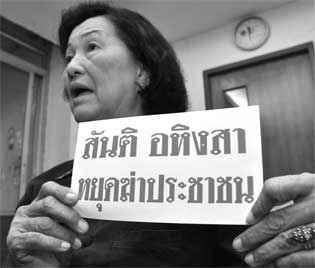
Mrs. Prateep’s sister, MIngpon Ungsongtham (65) said, “We keep in contact with her. She is fine but she feels bitter. She said, ‘I didn’t do anything wrong. Why do I have to have such a terrible experience?'” According to her sister, Mrs. Prateep made a “Peace and Nonviolence. Please don’t kill the people” sticker, and after the evening of May 16th she called out through a megaphone, “Please stop using violence. Please don’t take any more lives.” There was a report that she had put up a stage and made an inflammatory speech, but actually she didn’t. She just appealed to protesters to cool down, standing on a chair or on the bed of a pickup truck. But she sent some food in to the Red Shirts in their gathering. Did that make the Yellow Shirts angry?
Not only there is a warrant out for her arrest but also she is one of the 18 people whose assets are frozen. Since there are quite a few cases where her signature is required at her bank, the Foundation sometimes faces trouble in accounting. Some study tours from the U.S.A and Japan which was scheduled to come to see the projects in July and August were canceled, and individual visitors have decreased in number. Accordingly, donations to the Foundation also have decreased. On top of that, a bank, which was one of the supporters of the Yellow Shirts, stopped giving its support for the project to improve family finances of slum residents, which the Foundation has carried out in cooperation with the bank, because an arrest warrant for Mrs. Prateep was issued. The activities of the Foundation have not ceased, but surely slowed down. However, some supporting groups that have kept good relationship with the Foundation such as ones from Japan, America and Australia understand the situation as political oppression, and the scholarship system has been continued.
Disparity hinders understanding
When I visited a kindergarten in a slum, which was operated as one of the projects of the Foundation, I chatted with the staff. Ms. Penwadee (48), the manager of the Foundation, said that the words of Mrs. Prateep were left on her mind. Mrs. Prateep said, “In the face of difficulty middle-class people take a pause and deal with it in an indirect way, on the hand poor-class people behave impulsively because they are in a bad fix. Ms. Penwadee said that she had a good understanding of the demonstration itself, but that she was disappointed that the leaders only fanned their emotions and didn’t direct them to behave rationally, which caused the government to use force.
A female member of the staff beside me seemed vexed with daily happenings. “My son goes to a high school. His teacher said to his students, ‘I feel good today, because Major-general Khattiya was killed. I hate the Red Shirts.’,” she said. “The teacher didn’t notice that it was none other than violence to bring the Red Shirts under control by force of arms, and that violence lurked even in his mind. The important thing is to understand one another. If they understand where the opponents stand and how they feel, they will be considerate to each other. The reason why they can’t do so is that there is disparity and the disparity is too large.”
Ms. Penwadee personally hoped for the immediate dissolution of the present government and a general election. She wants a new government:
1. to levy taxes on inherited property and idle land and to provide the poor with land and dwellings with money from the tax revenue source
2. to provide free 15-year compulsory education to every children
3. to increase the income of the people without raising a consumption tax
4. to continue the uniform 30-baht medical care program.
She asked me to report that the reason why the government extended the state of emergency was just to hold the opponent group in check and that the present state of affairs in Thailand was not as bad as they might imagine.
A Japanese living in Bangkok
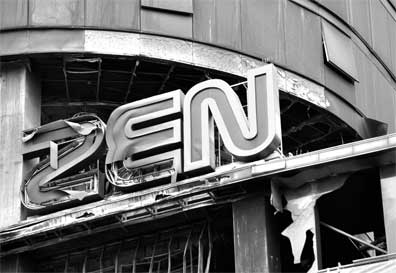
I visited a giant shopping center Central World, which was said to be set on fire by some of the Red Shirts who turned into a mob after their forced removal on 19th. I could see the charred wall from between the sheets covering the building under construction. At the north end of the building, the farthest away from the scene, only Isetan Department Store has reopened for the first time in two and a half months. In front of Isetan a statue of Ganesh stands. There used to be visitors coming to pray one after another. A woman (19) selling flower wreaths for offering said, “No stores except Isetan has opened yet, so sales decreased to 30 % of those before the demonstration. I’m demanding compensation from the present government.” A street vendor (30) selling T-shirts and drinks on the sidewalk said, “While I had closed my store since 19th for a month odd, T-shirts, stall and all were stolen. It is only the big stores in the building that the government will compensate.” The disturbance came to an end, but some ill-feeling seemed to remain.
“It has caused me a great deal of trouble,” said Mr. S. (44), a Japanese living in Thailand for 15 years. He works for a Japanese automobile components factory. He got married to Thai woman and has two children. He said with a discontented look that there was no place to go on Sundays because Central World was closed. The number of Japanese people living in Thailand is 70,000 or 80,000 including short-stay residents. Although the manufacturing industry was hardly affected, the service industry was hit badly because they lost customers. The number of Japanese visitors to Thailand was reduced by half to about 45,000 in May 2010. According to Mr. S., most of the Japanese people living in Bangkok view that the Red Shirts are mobsters or drug addicts who rage about by taking advantage of the opportunity, or miserable poor people. Thailand was affected by the world recession only for the first one year, but now there are many jobs in Thailand and enterprises are suffering from a shortage of workers. The daily wage of a junior high school graduate is about 270 baht and the monthly salary of a female high- school-graduate office worker is about 18,000 baht.
Mr. S. said, “The guys who were inside the barricade are scum. They surely don’t have political ideology. I want to say them, ‘Work!'” In his opinion, poor people don’t study without making use of the scholarship system and they do nothing but idle about because they can be self-sufficient in food at their country home. However, ‘the chain of poverty’, in which the children of poor families can’t have a hope or a dream for the future, and when they are grown up they don’t have the will to work, has also become a social problem in Japan, where the disparity between rich and poor has grown.
A differential between the rich and the poor?
This disturbance is referred to as class strife, but according to the research report issued by Dr. Apichat of the faculty of economics at Thammasat University in June 2010, the result from the survey made by asking about 5,500 demonstrators indicated that there were big disparities. The average monthly salary of the Red Shirts, most of whom are farmers or laborers, was about 17,000 baht. On the other hand that of the Yellow Shirts, most of whom received a higher education and secured stable jobs was about 31,000 baht. There was a double differential between them. However, this extent of income differential can be seen in Japan between the farmers in rural districts and white-collar workers in Tokyo.
The statistics in the business newspaper Krungthep Thurakij issued in October 2007 gave a rather accurate account of the real state of affairs in Thailand. In all the banks in the country there were 71,340,000 accounts in total; 66,100 trillion baht was on deposit in those banks; the average amount of money per an account was 92,567 baht. However, when large deposit accounts were excluded, there were 70,460,000 accounts, or 98.8 % of the total accounts, and the average amount of money per account was 24,513 baht, and the deposits account for only 26.2 % of the total deposits. This showed the social structure of this country where the middle class was small and the ratio of the rich to the poor was one to 99. There may also be a problem in the National Assembly that can’t introduce an inheritance tax and a fixed property tax.
When I was waiting for a bus for 10 minutes at a bus stop in Bangkok, came a bus with a sign ‘Free Bus on People’s Taxes’. The services for the poor which started during the Thaksin administration continued not only in local villages but also in cities. According to my Thai friend, a part of fare for a bus on a regular route, electricity charges under 1,000 yen in a month, and a third-class train ticket of the national railway are free. However, the citizens generally donate some money to a temple rather than pay taxes because they don’t trust the government, and the prices or contents of goods and services are often vague. In the evening I was caught in a squall, so I tried to take a taxi but I was refused. When many customers are expected, not a few taxi drivers refuse to take in a passenger by a taxi meter. Walking on the street, I fancied that the whole of this society was a hotbed of bribery.
Residents in slums express their opinion
Here is Khlong Toei Slum of Bangkok, where many Red Shirts live. In the 1960s when Thailand began to industrialize, farmers came to work as dock worker at Khlong Toei Harbor and began to live in the marshy areas near the harbor. This is the origin of Khlong Toei Slum, where about 80,000 people live now.
Ms. Sharow (49), who ran a general store here, said, “I actually saw soldiers shooting at the demonstrators from the high place.” Her anger seemed not to have calmed down yet. She joined a demonstration when she had time. Even if there was much evidence including eyewitnesses, photos and video tapes, the police would not treat the matter as a crime, and its trial would not take place in this country of today. She told me that the declaration of the state of emergency said, ‘If more than five people gather in a group, they shall be arrested,’ which is a hindrance in her business, because her store had been a ‘conference room’ for the residents for a long time. When I visited this slum for the first time to cover a story a quarter of century ago, I used to go from shack to shack walking on boards which were put on stakes driven into the marshy, but now concrete alleys were build and two-storied tiled-houses stood in a row, which was the fruits of the residents’ labors. At the same time it became possible for most of the residents to receive an education, so that the young people who can express their opinions have increased in number.
Ms. Bunmar. (35) couldn’t go home during the demonstration because the supplies of water and electricity to her apartment were cut off. She gave vent to her discontent with the present government. “The government doesn’t understand the poor people’s feelings. They always tell a lie and use force. They are not eligible to be a leader. It is “double standard” not to accuse the Yellow Shirts of what they have done including the closure of the airports. We cannot count on Thai mass media to make an unprejudiced report. The foreign journalist was killed because the materials he was gathering were unfavorable to them, right?” Ms. B., who was born in a slum but could receive school education, expressed her opinion logically, inserting an English word “double standard” in her words.
The Old “Leader of the Communist Party”
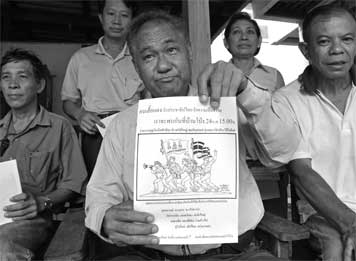
The big movement of this time reminds me of the 1970s. At that time Vietnam War and Lao liberation were going on, and anti-government movement of the communist party’s guerrillas flourished in Thailand. Away from the central area within Bangkok City there remain some houses with elevated floors just as they were in the 1970s. I met Mr. Srachai Dan Watananusorn (68) under the elevated floor of one of those houses. I saw agricultural implements placed there. Though he claims to be the leader of the “Thai Communist Party”, his title is self-styled because a communist party is an illegal existence in this country. In democracy a left-wing political party should be accepted unless it resorts to force, but in this country a left-wing party is thought to be equal with an anti-government guerrilla group or a terror group.
In the 1970s he belonged to a publicity corps of the Thai Communist Party and fought battles holing up in the jungle. In 1978 three people of the communist party were asked to attend peace talks, so he went out of the jungle, which was taken as surrender. He was brought to the military court on suspicion of communist activities, setting fire to the official residence of Surat Thani provincial governor and train robbery. Then he was sentenced to 16 years’ imprisonment and payment of 1,600,000 baht. He said, “I wasn’t sentenced to death because I was a political offender, I presume.” According to him, there wasn’t so-called thought-reform training in prison. There he taught other prisoners his skills, that is, how to repair radios and TVs.
Mr. Srachai continued in a firm tone, “There was a conflict of ideologies in the 1970s. Students, aiming at Indochina’s liberation, devoted themselves to the left and fought imperialism, capitalism and classism. At that time the right tried to control the left, and now the left is trying to control the right. We needed the people’s liberation before, but now we need a democratic revolution. The Red Shirts are demanding reforms but we are aiming at a ‘revolution’.” The words he was using were still daring. “The left of today are the Red Shirts and the long-time communists. One of our former comrades whom I fought with in the 1970s joined the Tai Rak Thai Party, and after that he became a leader of the Red Shirts. But he rushed forward and failed. The Red Shirts resemble me of those days in that they are in trouble because they have nowhere to go. I think they will eventually be pardoned during the next administration perhaps,” he said, showing his sympathy for them. “I have no intention to overthrow the present government, but as far as we keep the law and don’t go to extremes, doing activities is one of the choices, so I’m thinking we should step forward to lead them. We are going to gather in Ratchaburi Province in the south of the country, where the declaration of a state of emergency hasn’t been issued,” showing a bill of A4 paper, which says, “To those who love the Red Shirts, democracy and justice. Meet us at Bang Pong at 15:00 on July 24th.”
I steered the conversation to the existence of the royal family. I asked him whether he denied the existence of the royal family itself as a communist. Then surprisingly he gave me a flexible answer. Maybe he had learned his lesson during his long imprisonment. He said, “Japan has democratized under pressure from the U.S.A. after the defeat in the war. I agree to the Japanese Emperor’s being the symbol and not participating in politics. We should also learn from Denmark and Sweden where they have a royal family. In Japan there has been no problem because the political parties don’t use the Emperor. In Thailand the citizens don’t criticize the King, but the political parties make use of him. However, abolishment of the monarchy has too many harmful effects. If Thailand is a democratic state, there is no problem about the existence of the royal family. But Thailand needs a revolution. My life has been eventful and I am old now, but I shouldn’t live in retirement when my country has been thrown into chaos.” While I was interviewing Mr. Srachai, many comrades of his came one after another to prepare for the rally.
Where are the Yellow Shirts?
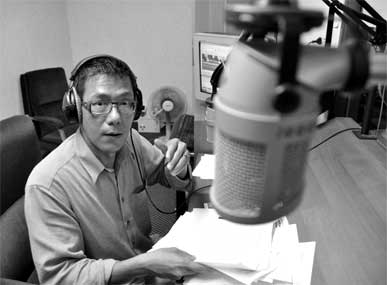
It was very difficult to interview the Yellow Shirts, though a supporter of the Yellow Shirts on the establishment side could speak anything without hesitation. In passing, the color ‘yellow’ of the Yellow Shirts is the King’s color. In Thailand color is assigned for each day of the week. King Bhumibol was born on Monday whose color is yellow. Considering the result of a general election, it seemed to be natural that there were many people whose opinions were close to the Red Shirts’, even though they were disgusted at some of the Red Shirts who had turned into a mob. Although it might not be so difficult to talk about the government view, it would require real resolution for an individual to express his/her own opinion close to the Yellow Shirts, because some of the Yellow Shirts weren’t innocent either.
In the meanwhile, I could meet Professor Yommarai. (45) of the political science department at Rangsit University. He has contracted to work as a producer of radio program at the Public Relations Department of the Prime Minister’s Office and broadcasted a one-hour program five times a week to Bangkok and its outskirts. The program on the day when I visited him was about the public stage performance of Ramayana. In the program he was to introduce it and have a university scholar of classical literature explain it on the telephone.
“King Bhumibol knows everything because he has ruled this country for more than 60 years,” he began with telling that he was supporting the royal family. Even though he is a supporter of the Yellow Shirts, he is very angry about recent pressure. The title of his program changed from ‘Living together regardless of ideas’ to ‘We love and respect our King’ in May 2010. Moreover, the authority gave orders to denounce the Red Shirts within the program in the following month, June. Mr. Y. in charge of the program doesn’t like to make an unfair judgment by default. He presented a proposal to have the Red Shirts concerned on the air or interview them on the telephone and debate with the Yellow Shirts’ side, but it was refused, and the broadcast beaming by satellite to the local areas was stopped.
The country that doesn’t seek truth
Mrs. Prateep had resigned the post of the chairwoman of Prateep Foundation just before an arrest warrant for her was issued, and all of 20 trustees, most of whom support the Yellow Shirts, consented to her resignation and Dr. Sant Hathirat succeeded her. Some of the Yellow Shirts who have power in political and financial circles have given support for getting rid of poverty. The new chairman Dr. Sant is a doctor and the leading expert of the emergency medial-care. He has known Mrs. Prateep since the 1992’s demonstration calling for the resignation of the then Prime Minister Suchinda of the military government.
The Duang Prateep Foundation was considered to be one of the Red Shirts on Thaksin side because they have raised the poor people’s low standard of living indirectly, by improving their standards of education and medical car for a long time. However, Dr. Sant said, “People have an image of us as a supporter of the Red Shirts, but those who have watched our activities for a long time understand us. There were also some violent groups among the residents in slums 18 years ago. But we have consistently followed the pacifistic line.” He asserted that they differed from the Red Shirts some of whom turned into a mob.
The new chairman, however, seemed very discontented with the current establishment. He enumerated the mysterious incidents. “In the information-oriented society of today, the methods of assassination have become craftier, making it look like a car accident or a personal fight. In April of last year, the Prime Minister in a car was attacked by the Red Shirts, but no one has been arrested, though the face of assailant must be on videotape. Who sniped at major-general Khattiya? No one except servicepersons can have such a skill. Although about 2,000 people were killed or wounded and the department store was set on fire, it has not been announced who committed those crimes. In June an oil tank was shot and the Red Shirts were suspected, but there were nine tanks and the shot tank was empty. Those mysterious incidents aroused a suspicion that they were put-up jobs by the government. The government wants to bring the people’s conflict to an amicable settlement, but in reality things haven’t gone that way. Prime Minister Abhisit studied in England, so he must know about democracy well. Everyone knows who is manipulating him behind the scenes, but no one can tell. In the first place, the present government was formed at the military base.”
He kept on criticizing bluntly, perhaps owing to his high society standing and his great age, “The reason why Thailand has not been developed is that this country doesn’t admit truths. Anyone who pursues the truth of this incident will not be able to stay in Thailand. The declaration of the state of emergency has still stood and the people under arrest haven’t released even after they gave bail. So Mrs. Prateep is obliged to live in retirement instead of presenting herself at the police, I think.”
Education cannot change people
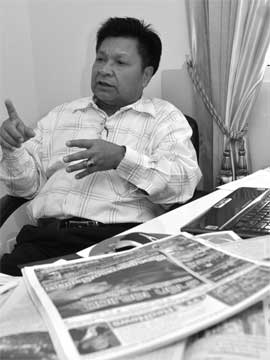
“The dictatorial government doesn’t want to lose power but won’t win an election, so they are afraid of the power of the people. This caused the demonstration to develop into bloodshed,” a former senator Mr. Wibooon Shamsheun (62) said positively. He also stated that the problem which Thailand had to solve was dictatorship. As long as the government turns a blind eye to undemocratic system, the dissolution of the National Assembly and a general election will not lead to the solution of the problem. I interviewed Mr. Wibooon at his elegant house in European style in the suburbs of Bangkok.
For seven years from 2007, he had been a senator and belonged to the board of education of the Ministry of Education. When he was 28 years old, he went to Japan to study. He studied at Hiroshima University for five years and got a doctor’s degree in education. In Thailand the educational administration ranging from preschool education to university education and adult vocational education centralizes in the Ministry of Education, but he was of the opinion that it should be decentralized into the government offices concerned and 175 local school boards. He said, “The central administration is so powerful that administrative affairs such as personal changes and designing a curriculum cannot be handled efficiently. A school board in various places is consisted of about 15 members but all of the members are teachers. Since there is no outsider in the school boards, the boards are isolated from the society.” Mr. B. added regretfully that he hadn’t been able to do anything as a member of the National Assembly because a senator couldn’t submit a bill.
Mr. Wibooon started the tabloid weekly newspaper The Red News in April 2009 at his own expenses, working as a chief editor, under the slogan “Democracy, Freedom, Justice and Equality” which were the problem Thailand had to be confronted with. People who have interested in politics including university professors volunteer to write for the paper. Besides about 2,500 copies of the newspaper for constant readers, 35,000 to 50,000 copies in all are sold at 420 bookstores in all parts of the country at 20 baht a copy. The newspaper carried the words “We love our King, defend democracy, and oppose every possible dictatorship” at the top and the bottom of the front page. The newspaper, however, has suspended publication after the May 21st issue. By the declaration of the state of emergency, the private assets of members of the Opposition have been frozen and so has Mr. Wibooon. He took it that the Red News was indirectly suppressed.
“There is a constitution in Thailand, but nobody observes it, so it’s nothing less than rubbish,” he said and pretended to throw away the book on the constitution into a waste basket by the desk. In 2007 after the coup a new constitution was introduced and Article 45 of the part ‘Liberty of Expression of Individuals and Media’ of the 2007 Constitution of Thailand provides that ‘the closure of a newspaper enterprise or other mass media in deprivation of the liberty shall not be made, and the censorship by a competent official of news and articles before their publication in a newspaper or other mass media shall not be made’, but a proviso follows, ‘except during the time when the country is in a state of war or armed conflict’. The 1997 constitution was supposed to be written by 76 provincial representatives, but in fact it was written by 25 representatives, that is, the constitution was written only by those in power not by citizens―he suspected. “It is completely obscure how to choose the personnel of the constitutional court which is an independent organ. Behind the Constitution the royal family does exist even now. Then, if the army should fail to protect the royal family, what would happen? It is unpredictable,” he said. “I studied pedagogy and have believed that education can change a man into another man, but I think we must change the system of the country after all.” He has decided to run for the National Assembly again.
Nong Bua Lam Phu Province, the northeastern region of the country
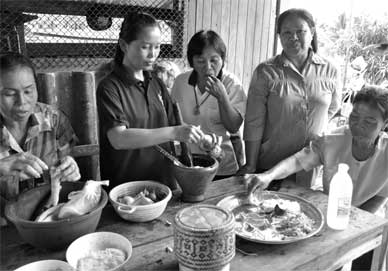
I left Bangkok and flew to the northeastern region, where many supporters of Thaksin live. One-time airport in the northeastern region was bleak. The place had been a U.S. military base during the Vietnam War, and after the war the Thai Air Force took over the place and rent it to the private airline companies. But now here Udon Thani Airport has completely changed into an airport with an international standard air terminal.
In Nong Bua Lam Phu Province, Udon Thani Province’s neighbor on the west, dinosaur fossils were found in 1996, and in 2001a dinosaur museum was open. The province has tried to build a tourist industry besides agriculture. Incidentally it was reported that the trail of the incident led to local areas. This province was one of those areas and a riot had occurred at the provincial office. I could see broken windows and marks of black smoke on the first floor of the building. The unpaved road way off the national road, where an eye-catching monument of a life-sized dinosaur stands, leads to a village on the plateau. The villagers can’t grow rice due to its topographical features, so they used to grow corn and jute but they have produced gum and tapioca for the past 10 years.
Ms. Chintanaa (56), one of the villagers, took part in the demonstrations at Bangkok three times, for ten days from March 12th, for four days from March 27th, and for four days from April 6th. About 50 villagers from the village with a population of about 2,000 attended the demonstrations. Three buses ran from this province for the demonstration free of charge, but they had to pay their expenses while staying in Bangkok. There was a report that demonstrators from the northeast region were rallied and paid a daily wage, but she said she hadn’t received any money and that she had joined the demonstration on her own initiative.
She said, “The reason for joining the demonstration was to demand democracy and a general election and to right the double standard by which illegality of the Yellow Shirts is not questioned.” When she attended the demonstration in April 2009, she felt people’s icy eyes. But this year the citizens of Bangkok welcomed the demonstrators. They provided them with drinks at China Town and set up tents around the Democracy Monument for each province separately. She said she had been moved at their warm reception. However, a 25-year-old man who attended the demonstration from this village was shot to death in the head at the rally in Pratunam. About 3,000 people, more than the overall population of the village, attended his funeral which was held at the village. “We didn’t use violence. The government exhibited a lot of weapons, claiming the weapons were seized from the demonstrators. But if we had had so many weapons, there would have been more casualties on the government side.” She also referred to the oil-tank-sniping case in question and she complained that violence was a frame-up of the government.
Ms. Chintanaa said that the days of the Thaksin administration had been good. They adopted the ’30-baht medical care’ program, installed solar batteries in the areas where electricity had not been brought, and lent money of the ‘village funds’ at one percent interest per month, which was half of the interest that was charged in a city. According to her, the ‘one village one product’ movement promoted by the Thaksin government had been a support to the poor villagers, though the products of this village were only cloths and dried bananas and much of them hadn’t been sold. The medical system and the village fund program have still continued but the government is just only following the policy of the former government. During the Thaksin administration the public servants worked honestly, saying they earned their living from tax. However, current public servants demands bribe indirectly. When she went to the public office to transfer her land title to her son, she was said, “You see an explanatory note over there. Do it by yourself!” And when she went to a hospital, she was said spitefully, “Louder! I can’t hear you.” She paid 500 baht for the transfer of the register because it seemed to take long time before she completed the procedure.
She said that she still loved the King. “I think true information hasn’t been reached to the present-day King. That’s the problem. He often made a fact-finding tour of the local areas before, carrying a camera by himself. And he built a dam. But now I suspect that only one-sided information has been conveyed to him.” She took the view that the King was made use of by the government and could not keep his neutrality.
I noticed more than ten villagers gathered at Ms. Chintanaa.’s house. They heard that a foreign journalist had come. The emergency declaration has not been lifted in this village, so when more than five people get together they have to report to the village headman in advance. But the village headman Mr. Udon (65) was among them. He said, “I just inform them, and whether to obey or not is up to the villagers. I will not be torn between the government and the villagers.” Village headman used to be chosen by a show of hands, but since 1990 headman has been decided by vote, but the voters should show their identification before voting. Mr. Udon was the first headman chosen by vote and has served four terms, 20 years, as village headman. As Mr. U. suffers from chronic hypertension, he didn’t go to Bangkok but served as an organizer behind the scenes, though he attended the rally in front of the provincial office.
The villagers in another village in Nong Bua Lam Phu Province started growing paddy straw mushrooms with the village funds seven years ago and the undertaking is going well. The villagers put the profit into the village funds and the funds currently amount to three million baht, three times as much as the original funds. The new agriculture which follows the trend of the times seems to take root in the northern part of Thailand, where the people have been tormented by drought and fluctuations in prices. When I visited here in 1980s, I got an image of here as an impoverish village, but the clothes the villagers were wearing and the cars they were riding now erased my image. Yet the villagers of this village worry about the future. During the Thaksin administration the villagers could spend the budget from the government on a project necessary for their village by their consensus, but after the new administration started, government bureaucrats have spent the budget on useless projects like job training at their own discretion.
Local Yellow Shirts
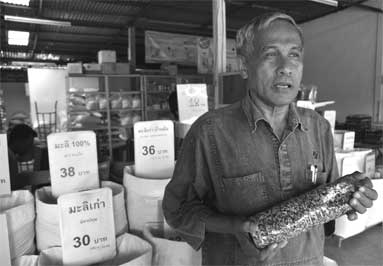
Mr. Jundabao (69), who runs a rice shop on a shopping street of Khon Kaen City, which lies to the south of Udon Thani in the northeastern region, regards himself as a supporter of the Yellow Shirts. The state administration is divided in interests or morals. You can buy a vote with money but cannot buy morals with money. He talked on the premise that it was the right thing to have dissolved a party supporting the Red Shirts on the ground of election offenses. “The Red Shirts insists on conducting a general election no matter how the result is, but they are irresponsible to say so, because the helm of state will be left to the winner,” said the old man wearing washed-out jeans, scooping some grains of rice out of a rice bag to check them.
“Thaksin gave his wife facilities when she bought the land, and in a local area government officials lined their own pockets by selling official cars without inviting tenders. Assemblymen and the likes close to them got the information on a road construction plan in advance and bought the land, and then they planted cheap trees on the land. They made money out of the land. In Thailand unfair practices are rampant, but the leaders must not do openly.”
Mr. Jundabao showed “organic grains” in a plastic bottle. He said he was going to put it on the market soon. He busied himself in developing a new product, even though he was nearly 70 years old. Because there isn’t a pension system that he can rely on, I presume. “I approve the village fund program itself, but it is assemblymen that decide how to use it, and the money is used only for making facilities such as a rice mill or a warehouse, or it is not used at all. Or twenty or thirty thousand baht per villager is given. But what can they do with such a small amount? They can buy a cell phone or a motorcycle, but that’s all.” He talked about only things favorable to the Yellow Shirts. He is a very follower of the Yellow Shirts.
Khon Kaen industrial association
Thailand’s industry and commerce account for 63 % of its gross national product, and agriculture 17%. According to the statistics of the products converted into money, Thailand is no longer an agricultural country. 70 % of the industrial products produced in Khon Kaen here are for export. The industries in Khon Kaen includes fishery, which has the largest share of the market in the world, garments, shoes, electronic parts and paper. According to the Khon Kaen industrial association, the industries were hardly affected by the last disturbance.
Mr. Khunwasi (50), who deals in autos together with his relatives, said, “The political disturbance hasn’t affected us at all. Sales of autos in Khon Kaen have been on the rise.” The soaring of oil prices in 2008 had affected his business for three or four months, but 1,800 autos were sold in 2009 and more than 1,200 autos were sold within half a year in 2010. 55% of them were one-ton pickups of a little less than 500,000 baht and 45% were cars. A down payment is 0 to 15% and an auto can be bought with a loan that’s repayable over a maximum of seven years.
“The point is whether to give food to people with food problem or to teach them how to grow food. Thaksin gave food. But he did it with the money from the state budget. He lined his own pockets behind the scenes by privatizing the oil company and listing its stocks on the stock market. Thaksin said that he would close the disparity between the rich and the poor, but it was only a pose,” Mr. K. said. Hot coffee was served in the well air-conditioned showroom, where there was not a speck of dust, let alone a trace of mud, and shiny new cars were displaced.
“The quality of politicians is in question, but it is a reflection of the nation. The problems are the common idea that ‘if a politician achieves good results, it can’t be helped that he takes bribes’ and the Thai society where when a mother with a hungry child shoplifts, she will be overlooked. If one of our workers causes a loss to our company, we will not fire him or demand compensation for the loss when it is by accident, but we will hand him over to the police when it is by embezzlement. In this country no thorough investigation is made and things are left unfinished. The police, the prosecution and the court aren’t functioning. This country has not been ready for democracy. Unless it is ready, conducting a general election is useless.”
An easy explanation for foreigners to understand
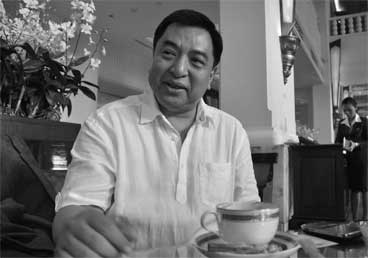
Mr. Wappadon (39), who runs a video production in Khon Kaen City, has a critical opinion about the Thai people, though he is not a supporter of Thaksin either. “The Thai people assert only their rights but they don’t fulfill their duties. In this society money talks louder than people’s abilities. There are many people who look for a legal loophole, and the present government imitates only the form of the advanced countries.” He said that his friend became a senator but he was in no condition to do something, with an anarchistic air as if to say that it was no use arguing.
When I got back to Bangkok, I went to the lobby of a first-class hotel which my interviewee had designated. The interior design of the hotel was luxurious and the service was of high quality, and the price of a cup of coffee was equal or higher than that in Tokyo. I couldn’t help thinking that there was imbalance of development in the chaotic politics and the social systems. I fancied that Japanese hotels catering to foreign customers in the period of the Meiji constitution were like this. Then, the former chief of the public relations department in the Thaksin administration, Mr. Suranand Vejjajiva (49) showed himself in the lobby. He is a cousin of the present Prime Minister Abhisit. He runs a PR company at present and he writes a column in nearly half a page for Bangkok Post on every Friday.
The reason for the dissolution of the parties supporting the Red Shirts, which caused the bloodshed demonstration, was election offenses. The undercover agents have a list of 100 to 200 voters each and they are buying votes for 100 to 500 baht per vote. According to him, Mr. Y., elected from Chiang Rai and president of the National Assembly, was denounced for buying votes. But some members of the ruling party, the Democratic Party, committed the same offenses, but their cases weren’t into court. Though many people point out ‘double standard’, might is right as the proverb says. There is a problem in the separation of legal, administrative, and judicial powers.
Lese Majesty
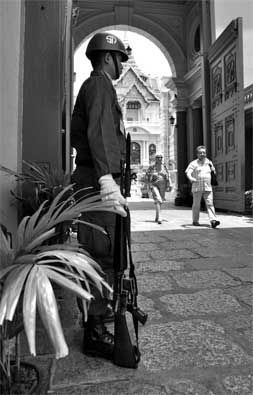
Most of the intellectuals in Thailand view that a chain of the incidents was caused by the unsettled problem of the successor to the throne. The problem arose before the coup in 2006 and it hasn’t settled. Thai people know it. It is the accepted view that the Thaksin government was overthrown by the Privy Council that consists of former prime ministers and the likes of them, because the Thaksin group lacked consideration for the royal family.
In passing, the present king Bhumibol Adulyadej, Rama IX of Chakri Dynasty, was born in 1927. In 2006, the 60th anniversary of his accession was celebrated with the imperial families and royal families from 25 countries including the Emperor of Japan, but the King has been in and out of hospital repeatedly since 2007 and there is growing uneasiness among the people. If diminishing signs of his charismatic influence begin to appear and there is no hope of the settlement by measures beyond the law, they have no choice but to administer the affairs of state democratically in accordance with the Constitution.
The queen attended the funeral for a Yellow Shirt. Prime Minister Abhisit formed a reconciliation committee and a political reform committee with only the supporters of the royal family. The royal family intervened in the personnel affairs of top government officials, and former guardsman was appointed as the Army Commander. Thai citizens had believed for a long time that the king kept his neutrality, but recently they seemed to realize that he didn’t. The major reason why the Yellow Shirts are unwilling to approve the result of the election is probably that the royal family and those who have backing of them are afraid of losing their privileges.
Naturally, Thailand has its constitution and court as well. But in Thailand there is a law of ‘lese majesty’ against the royal family. If an opinion of an opposition party or a citizen calling for reforms leads to reduce vested interests of the royal family group, even as a result, lese majesty will be applied. On top of that, a state of emergency, where the police can arrest people without a warrant, will be often declared.
Mr. Suranand was once on the government side, so I asked him about lese majesty, which was the most delicate issue. He said, “We must be very careful, because the royal family has been used for politics. There is no clear criterion for applying lese majesty. It depends on whether the person is a friend or an acquaintance of a person in authority, whether he/she is liked by the government side or not, or how wide he/she is known. If I were under arrest, it would become news. But little-known people must be careful because they will probably be treated cruelly.” If commercial broadcasting or internet newspaper is suppressed, the Thai society will not show any interest, and as emergency law has been imposed, nothing can be done. If a case is brought into court, evidence of guilty is needed, so the government uses the declaration of a state of emergency for suppressing everything.”
The thing Mr. Suranand wants to tell as a journalist before everything else is that the government should take the responsibility for the demonstrators’ death. About 90 people were killed. The government must make it clear who killed them and for what. There was a report that the army was involved in the incident where six people were killed at Wat Pathum Wanaram (a shelter with a medical tent), and he wants the government to explain about it. There are many committees to check the government, but they have no claim to being an inspection committee. In Japan a prime minister would already have submitted resignation. There is no way besides the dissolution of the National Assembly and a general election,” he concluded.
Pent-up discontent gushed out
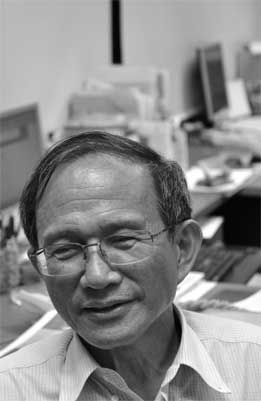
I listened to his analysis, taking notes. “Thaksin is not the only person that is to blame. It’s a generational issue. Thaksin has a short temper and he has accelerated and overdone it. The clash could be foreseen, but the solidarity of the Red Shirts was monolithic and no one could stop it. An increasing number of people are saying that the Red Shirts aren’t in the wrong, but it is not good to try to win by all means, by fair means or foul. If they win by force, the society will be ruled by violence. The present government has often declared the state of emergency, which is also not good. People cannot talk to the government frankly and even an assassination might occur.”
“Globalization has accelerated the expansion of differentials between the urban areas and the rural areas and the classification of social classes. Globalization itself isn’t bad. The country only relies on the structure where 60 % of GDP is goods and service exports, with the result that some people have profited but some have been left behind, which causes the differentials wider. The problem is that the politicians make use of the differentials. On the other hand, the Thai people became to put a high value on material things, because the country has developed without any consideration for human rights, environment and ecology.
As the King is superior to the constitution, he must change in accordance with time. The unification of the nation is important, but I don’t think monarchy is good. It’s good in the short-term for the country to have a good king, but in the long-term it is dangerous. It is not sound that the king is used for politics, so that there is no choice for the royal family in Thailand but to be the symbol.
‘Watermelon Soldiers’ and ‘Tomato Police’
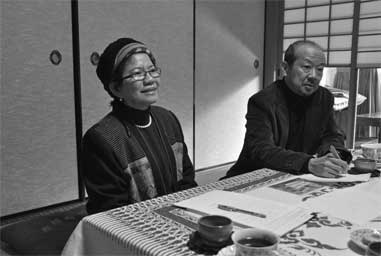
In November 2010 it turned out by the bulletin mail of the Duang Prateep Fundation to Japanese supporters that Mrs. Prateep had come to Japan in May. That was very likely, because her husband and her second child live in Japan. But her going through the departure formalities would be tantamount to giving herself up to the police, because there was a warrant out for her arrest. I had thought she would not be able to come to Japan, so I was surprised. I wondered how she could have come. The mass media in Thailand haven’t reported any news about her whereabouts. The declaration of state of emergency which had lasted in four provinces including the capital Bangkok to the end was finally lifted at the end of the year 2010 and only the existing internal security act remains. Now that the warrant for her arrest on suspicion of violence of the emergency law was withdrawn, I’ll be able to see her.
Mrs. Prateep was greeting the New Year of 2011 at her husband’s parents’ house in Ukiha City, Fukuoka Prefecture, Japan. She was wearing a worsted cap even in a house because of the cold of a Japanese winter. She said, “My husband gave me a call, worrying about my safety. He said he would come to Thailand at once, but I said I would come to Japan instead, because I would be safer with my husband, wouldn’t I?” she grinned at me with a mischievous look. I asked her about her mysterious departure. “There are the terms “watermelon soldiers” and “tomato police” in Thailand. They said, ‘The order to arrest Mrs. Prateep will be issued soon,’ and then I was taken to the safe place. At the airport I was also guided and I could leave the country easily.” The outside of a watermelon is green but its inside is red. The outside and inside of a tomato is all red. There are supporters for Thaksin and the Red Shirts among the police and the army who obey to the present government ostensibly but resist inwardly. “I was worried for a while after I arrived in Japan that Thai embassy might use its influence to make the Japanese government cancel my visa,” she said. Fortunately her fears proved groundless.
“Thaksin administration put into effect the policy to raise the poor people’s standard of living for the first time. However, every government was corrupt, including Thaksin’s. As I hate injustice and violence, people may think I am a supporter of Thaksin or a Red Shirt. But I’m not either of them.” After she made her standpoint clear, she said, “I got acquainted with many prime ministers. A government that works for the people is a good government for me. So I know which government is the best.” She has no intention of settling down in Japan. She will go back to Thailand around the middle of January and resume her work at the Foundation. She carefully avoided statements that might drag her into the confusion again.
The characteristic of the nation
During my stay in Thailand I interviewed quite a few people, some of whom I had to leave out, but their opinions made me feel as if I were back to my starting point. I started this interview tour to find the answer to my question-why hasn’t democracy become established in Thailand? And the first answer I got was my Thai friend’s pet saying, ‘Thailand lies in the tropics’. Being proud and patriotic is not enough to explain the characteristic of the people in the tropics. The Thai people have a disposition to rush headlong as if to pay no heed to the future and not to cling to the past. They seem to have an enviable disposition to the Japanese people who are irresolute, worrying about their living, but at the same time they seem reckless. If the Thai people hadn’t had such characteristics, as many as 2,000 would not have been killed in the disturbance.
Such a winter as people may die of cold if there is no fuel and an airtight house will not come to Thailand. And the greater part of the national land is plains and the sea spreads out to the south, so the Thai people will not die of hunger either, thanks to produce from the land and the sea. Since Thailand is the place blessed with the riches of Nature and easy to live, the people are big-hearted and have the spirit of mutual aid, so they can live somehow without much savings and a steady income or without a concept of strict contract.
A lot of people, goods and information come and go between Thailand and the countries in the temperate zones in a short time, carrying the values of each country. The characteristics of the Thai people cannot be separated from the tropical climate and the fertile land. I wonder democracy that is adopted as the best system by the countries in the temperate zone will establish in Thailand. It is improbable to repeat or to go back to the early state. Then how will democracy establish in Thailand? All I have to do is continue to cover the state of affairs in Thailand.

